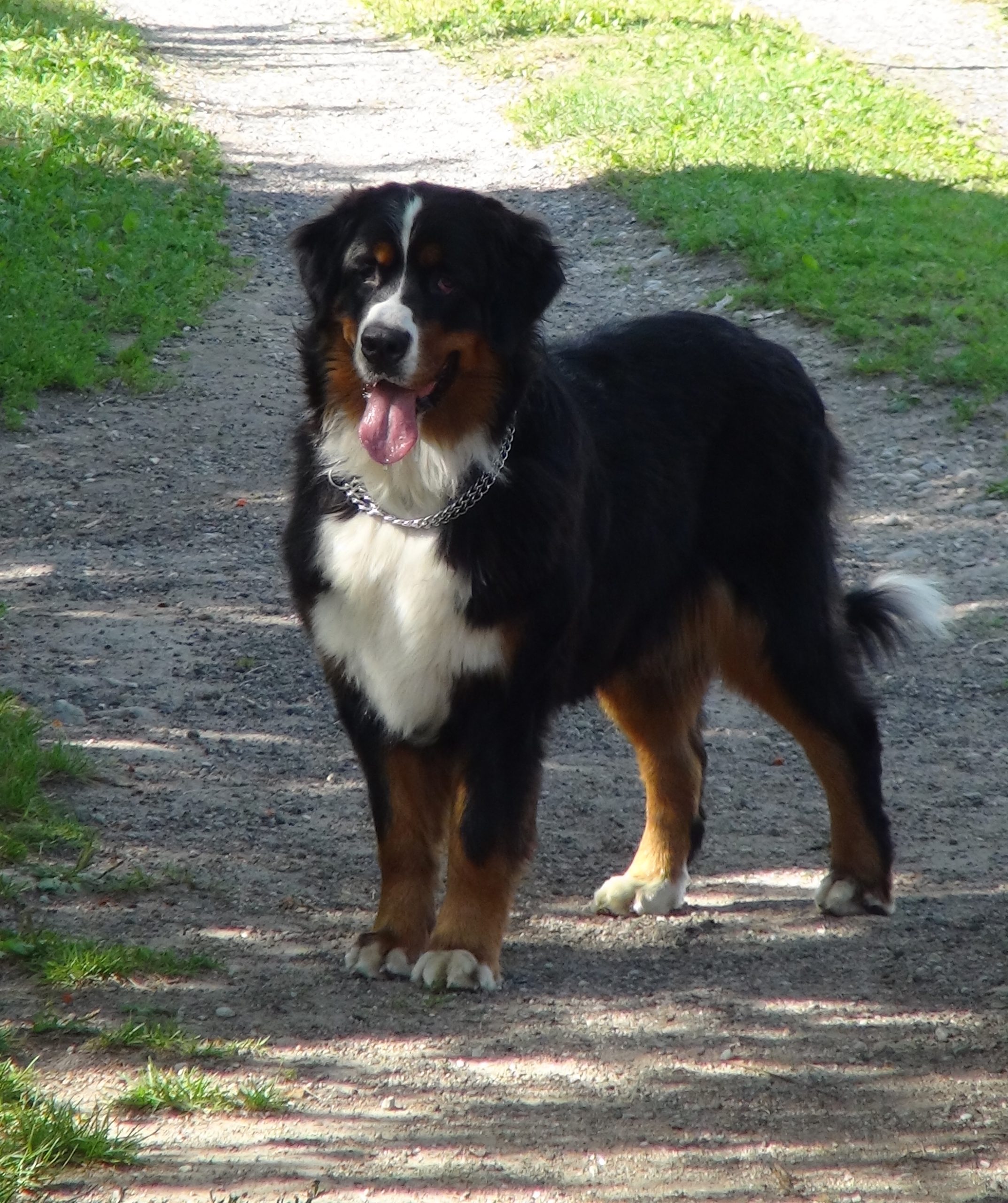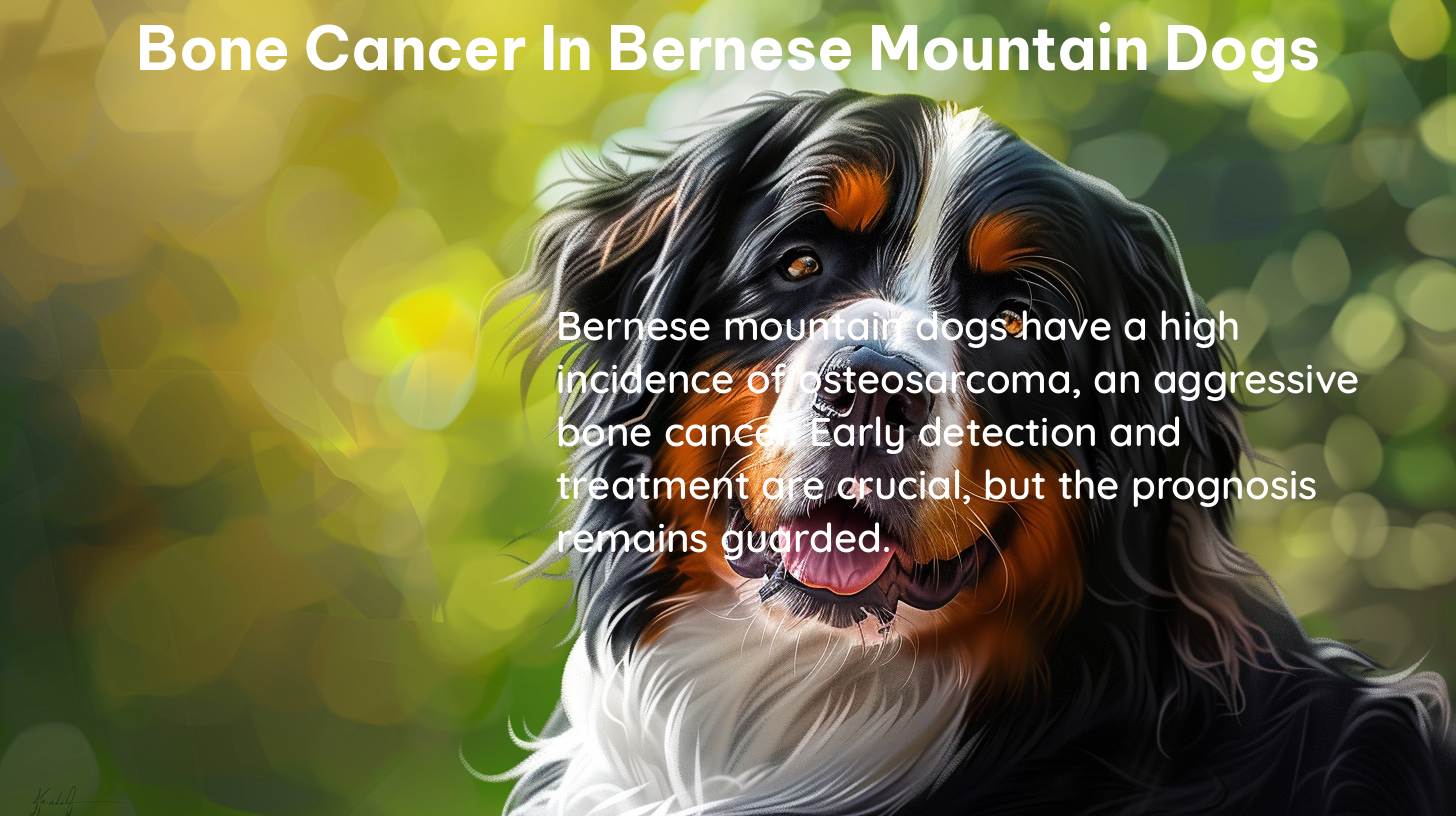Bone cancer, specifically osteosarcoma, is a significant health concern for Bernese Mountain Dogs. As a large breed, these dogs are more susceptible to this aggressive form of cancer that primarily affects the bones. In this comprehensive guide, we’ll explore the common symptoms, detection methods, and available treatment options for bone cancer in Bernese Mountain Dogs.
Symptoms of Bone Cancer in Bernese Mountain Dogs

One of the most common signs of osteosarcoma in Bernese Mountain Dogs is lameness or limping. The tumor on the bone can cause significant pain, leading to a reluctance to use the affected limb. Additionally, you may notice the following symptoms:
- Swelling: A firm, bony mass may be palpable in the affected area, often accompanied by warmth due to inflammation.
- Loss of Appetite: Dogs with osteosarcoma may show a decrease in appetite due to pain and discomfort.
- Reluctance to Walk or Play: The pain caused by the tumor can make dogs less active and less willing to engage in physical activities.
Detecting and Diagnosing Bone Cancer in Bernese Mountain Dogs

Early detection is crucial for the successful management of bone cancer in Bernese Mountain Dogs. Your veterinarian may use the following methods to diagnose the condition:
- X-rays: X-rays are typically the first step in diagnosing osteosarcoma, as the tumor often appears as a lytic (moth-eaten) or permeative lesion on the bone.
- Fine Needle Aspiration: A fine needle aspiration may be performed to collect a sample of cells from the lesion for examination under a microscope.
- Bone Biopsy: If the fine needle aspiration is not conclusive, a bone biopsy may be necessary to confirm the diagnosis.
Treatment Options for Bone Cancer in Bernese Mountain Dogs
The primary treatment options for osteosarcoma in Bernese Mountain Dogs include:
- Amputation: Amputation of the affected limb is often the primary treatment, especially if the tumor is localized.
- Chemotherapy: Chemotherapy is usually pursued post-surgery to help control the spread of the disease and improve the dog’s quality of life.
- Radiation Therapy: Radiation therapy may be used as a palliative treatment to reduce bone pain.
Prognosis and Life Expectancy for Bernese Mountain Dogs with Bone Cancer
The prognosis for Bernese Mountain Dogs with osteosarcoma can vary, but some key points to consider:
- Median Life Expectancy: The median life expectancy for dogs with osteosarcoma is about a year if treated with chemotherapy and stereotactic radiation.
- Survival Rates: About 15% to 30% of dogs can expect a survival time of two years.
Preventing and Detecting Bone Cancer Early in Bernese Mountain Dogs
To increase the chances of early detection and treatment, it’s essential to:
- Schedule Annual Veterinary Visits: Regular check-ups with your veterinarian can help detect any potential health issues, including bone cancer, early on.
- Monitor for Symptoms: Be aware of any changes in your Bernese Mountain Dog’s behavior or physical condition, such as lameness or swelling, and consult your veterinarian if you notice anything unusual.
Breed-Specific Risks for Bone Cancer in Bernese Mountain Dogs
Bernese Mountain Dogs are one of the breeds more prone to osteosarcoma due to their large size. There appears to be a genetic risk factor present in large- and giant-sized dogs, making them more susceptible to bone cancer.
Additional Health Concerns in Bernese Mountain Dogs
While bone cancer is a significant concern, Bernese Mountain Dogs are also at higher risk for other health issues, including:
- Hemangiosarcoma: A type of bleeding tumor that commonly forms in the spleen.
- Hip and Elbow Dysplasia: Conditions that can lead to arthritis and mobility issues.
- Lymphoma: Another type of cancer that affects Bernese Mountain Dogs more frequently than other breeds.
By understanding the symptoms, detection methods, and treatment options for bone cancer in Bernese Mountain Dogs, you can be better prepared to address this health concern and provide the best possible care for your furry companion.
References
- VCA Animal Hospitals. (n.d.). Osteosarcoma in Dogs. Retrieved from https://vcahospitals.com/know-your-pet/osteosarcoma-in-dogs
- Pawlicy. (n.d.). Osteosarcoma (Bone Cancer) in Dogs: Causes, Symptoms, Treatment. Retrieved from https://www.pawlicy.com/blog/osteosarcoma-in-dogs/
- Fruitville Veterinary Clinic. (n.d.). Bernese Mountain Dog – Breed Info. Retrieved from https://fruitvillevet.com/client-resources/breed-info/bernese-mountain-dog/
- ASPCA Pet Health Insurance. (n.d.). Bone Cancer in Dogs. Retrieved from https://www.aspcapetinsurance.com/resources/bone-cancer-in-dogs/
- PetCure Oncology. (n.d.). What You Should Know About Osteosarcoma (Bone Cancer) In Dogs. Retrieved from https://petcureoncology.com/what-you-should-know-about-osteosarcoma-bone-cancer-in-dogs/.

Sarah Johnson
Sarah Johnson is a devoted Bernese Mountain Dog enthusiast and regular contributor to Bernese Mountain Dog Pro. With over a decade of experience in raising and training Berners, Sarah brings practical knowledge and passion to her writing. Sarah lives in Colorado with her two Berners, Max and Bella.